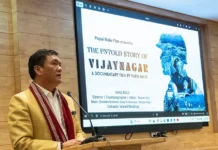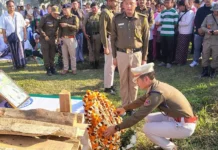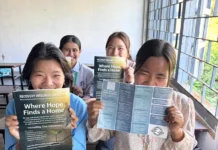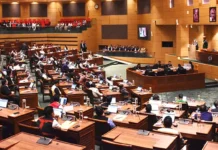MEDO, 25 Jul: An awareness campaign against drug abuse and illicit poppy cultivation was held at the Tamladu festival ground here in Wakro subdivision in Lohit district on Friday.
The event was organized by the district administration, in collaboration with the Police Department and the Department of Tax, Excise, and Narcotics.
Delivering the keynote address, Deputy Commissioner Kesang Ngurup Damo strongly urged the public to refrain from opium cultivation, terming it both illegal and socially harmful. He emphasized that development and dignity cannot go hand-in-hand with drug dependence, and outlined various livelihood schemes such as ANKY, ANBY, and ANPPY, which the government is actively promoting. He also informed that efforts are underway to link local farmers and entrepreneurs with the Indian Army and the ITBP for procurement of local produce – a move that promises economic opportunity without harmful practices.
SP Thutan Jamba addressed the legal implications of drug and opium-related activities. He spoke in detail about the NDPS Act and stressed that both cultivators and those aiding or abetting such acts will face stringent legal action.
Wakro ADC AJ Lungphi emphasized the strategic timing of the awareness drive – coinciding with the usual sowing season of poppy – to send a clear warning that illegal cultivation will not be tolerated.
ZPM Balong Tindya sent a strong appeal to the community to eradicate opium cultivation entirely from the Mishmi society in order to move towardsprosperity and development.
CALSOM Wakro block secretary Sanjay Ngadong emphasized the need for a dedicated de-addiction centre in Lohit district and called for “strict action against drug peddlers, targeting the demand side of the drug menace.”
CALSOM women’s wing general secretary Bihem Lap appealed to parents to protect their children from involvement in opium cultivation. She highlighted how drug addiction not only drains families financially but also destroys peace and wellbeing.
The gaon bura of Tangsa Dellang reminisced that addiction was rare in the earlier days and pledged that GBs would lead the fight by committing to a drug-free lifestyle and promoting the same among their villagers.
Retired PHED CE and social worker Lupalum Kri emphasized that opium should not be defended on cultural or ritualistic grounds. He advocated forming a local task force in every village to fight drug abuse and opium cultivation.
Veteran leader Sotai Kri highlighted the socioeconomic damage caused by opium, and stressed on tapping alternative livelihoods through sustainable agriculture and skill development.
The event was attended by heads of departments, PRI members, public leaders, SHG women, students, and community members. (DIPRO)




